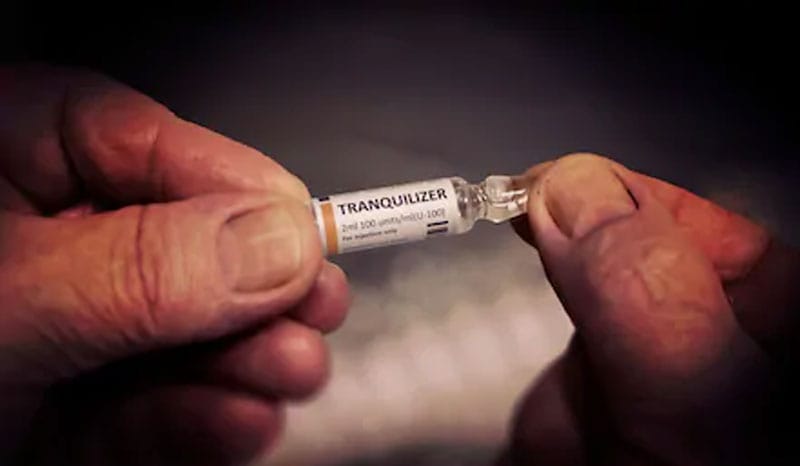Horse tranquilizers, also known as dissociative anesthetics, have powerful sedative effects on the central nervous system in humans.
When consumed, these substances can induce hallucinations, dissociation, and a sensation of being detached from reality.
Due to their potency, horse tranquilizers are dangerous for human use and are classified as controlled substances.
Abusing these drugs can lead to serious health risks, including respiratory depression, seizures, and even fatal overdose.
It’s important to note that using horse tranquilizers for recreational purposes is illegal and highly discouraged due to their potential harm to physical and mental well-being.

Risks and Side Effects of Using Horse Tranquilizers on Humans
While horse tranquilizers, such as ketamine, may have legitimate uses in veterinary medicine, their misuse in humans can lead to serious risks and side effects. It is important to understand the potential dangers associated with the use of these substances outside of their intended purpose.
1. Physical Health Risks
Using horse tranquilizers can have detrimental effects on the overall physical health of humans. Some of the risks include:
- Cardiovascular Effects: Horse tranquilizers can cause an increase in heart rate and blood pressure, potentially leading to heart problems or even cardiac arrest.
- Respiratory Distress: These substances may impair breathing and result in respiratory distress, especially when taken in larger doses.
- Organ Damage: Prolonged use of horse tranquilizers can damage various organs, including the liver and kidneys, leading to serious health complications.
2. Psychological Risks
The use of horse tranquilizers can also have profound psychological effects on individuals. Some of the risks include:
- Depression and Anxiety: Misuse of these substances can trigger or worsen symptoms of depression and anxiety disorders, leading to mental health issues.
- Hallucinations: Horse tranquilizers may cause hallucinatory experiences, which can be distressing and disorienting.
- Psychosis: In some cases, prolonged use of these substances can induce psychosis, characterized by a loss of touch with reality.
3. Addiction and Dependence
One of the significant risks of using horse tranquilizers is the potential for addiction and dependence. These substances can be highly addictive, leading to compulsive drug-seeking behavior and withdrawal symptoms when discontinued. Addiction to horse tranquilizers can have severe social, occupational, and personal consequences.
4. Accidental Overdose
Due to the potent nature of horse tranquilizers, there is a high risk of accidental overdose. The therapeutic dose for horses is drastically different from that for humans, and miscalculations can lead to life-threatening situations. Additionally, combining these substances with other drugs or alcohol can increase the risk of overdose and fatalities.
5. Legal Consequences
It is essential to note that the non-medical use of horse tranquilizers is illegal and can result in legal consequences if caught in possession or distribution of these substances. Engaging in illicit activities involving these drugs can lead to arrests, fines, and potential imprisonment.
Summary
Using horse tranquilizers on humans poses significant risks and side effects, both physically and psychologically. These substances can adversely affect cardiovascular health, respiratory function, and various organs. They can also lead to addiction, dependence, and accidental overdose. Furthermore, the non-medical use of horse tranquilizers is illegal and can result in severe legal consequences.
It is crucial to prioritize individual safety, seek professional medical help when needed, and avoid the misuse of substances intended for veterinary use.

Understanding the Mechanism of Action of Horse Tranquilizers in the Human Body
In this section, we will delve into the fascinating topic of horse tranquilizers and their mechanism of action in the human body. Horse tranquilizers, also known as sedatives, are medications commonly used in veterinary medicine to calm horses and other large animals. These tranquilizers belong to a class of drugs called alpha-2 adrenergic agonists, which have profound effects on the central nervous system.
Alpha-2 adrenergic agonists work by binding to specific receptors in the brain and spinal cord, known as alpha-2 receptors. This binding action inhibits the release of norepinephrine, a neurotransmitter that plays a key role in regulating various bodily functions, including mood, sleep, and heart rate. By reducing the release of norepinephrine, horse tranquilizers produce a calming and sedative effect on the body.
When administered to humans, horse tranquilizers can have a range of effects depending on the specific drug used. One commonly used horse tranquilizer is called xylazine. Xylazine works by activating alpha-2 receptors in the brain, leading to sedation, muscle relaxation, and decreased pain sensitivity.
Another horse tranquilizer that has gained attention in recent years is ketamine. Ketamine is a dissociative anesthetic that produces a trance-like state, sedation, and pain relief. It works by blocking N-methyl-D-aspartate (NMDA) receptors in the brain, which are involved in the transmission of pain signals. Ketamine’s unique mechanism of action sets it apart from other horse tranquilizers, making it a valuable tool in both veterinary and human medicine.
It is worth noting that while horse tranquilizers can be effective in calming and sedating horses, their use in humans is strictly regulated and limited to specific medical purposes. Horse tranquilizers are not approved for human use by regulatory authorities such as the Food and Drug Administration (FDA) in the United States. Any use of these drugs in humans should only be done under the supervision and prescription of a qualified healthcare professional.
In summary, horse tranquilizers, or sedatives, belong to the class of alpha-2 adrenergic agonists. They work by binding to alpha-2 receptors in the brain and spinal cord, which inhibits the release of norepinephrine, resulting in a calming and sedative effect. While these drugs have proven effective in veterinary medicine, their use in humans is strictly regulated and should only be done under medical supervision.

Medical Uses and Potential Misuse of Horse Tranquilizers in Humans
Horse tranquilizers, also known as equine sedatives, are commonly used in veterinary medicine to calm horses and facilitate various medical procedures. However, these powerful drugs have also gained attention in recent years for their potential misuse in humans. In this section, we will explore the medical uses of horse tranquilizers and the concerning trend of their misuse, highlighting the associated risks and legal implications.
Medical Uses of Horse Tranquilizers
Horse tranquilizers, such as acepromazine and xylazine, belong to a class of drugs called tranquilizers or sedatives. These medications are primarily used in veterinary practice to relax and calm horses in various situations, including:
Sedation for medical procedures: Horse tranquilizers are commonly used to sedate horses during dental procedures, suturing wounds, or performing surgical interventions.
Management of behavioral issues: Horses with anxiety, aggression, or hyperactivity may benefit from the administration of tranquilizers to reduce stress and facilitate training.
Transportation: Long journeys or stressful transportation situations can be eased by administering horse tranquilizers to keep horses calm and prevent injury.
Routine veterinary examinations: For horses with extreme fear or resistance towards medical examinations, tranquilizers can be used to facilitate a thorough examination.
The use of horse tranquilizers in veterinary medicine is strictly regulated, and they are only administered by licensed veterinarians who have the expertise to determine the appropriate dosage and monitor the animal’s response.
Potential Misuse in Humans
Despite being intended for veterinary use, horse tranquilizers have found their way into the realm of human recreational drug use. Some individuals experiment with these substances due to their potent sedative effects, seeking a sense of euphoria, relaxation, or dissociation. However, the misuse of horse tranquilizers in humans is highly dangerous and illegal.
Common risks associated with the misuse of horse tranquilizers in humans include:
Overdose: Horse tranquilizers are significantly more potent than many human sedatives. Consuming these drugs without proper medical supervision can lead to overdose, resulting in respiratory depression, loss of consciousness, or even death.
Physical and psychological dependence: Prolonged misuse of horse tranquilizers can lead to dependence and addiction. Individuals who become dependent on these substances may experience withdrawal symptoms upon discontinuation.
Psychiatric side effects: Horse tranquilizers can induce hallucinations, delirium, and other psychiatric symptoms. These effects can be unpredictable and pose a risk to both the individual using the drug and those around them.
Legal consequences: The possession, distribution, or misuse of horse tranquilizers for recreational purposes is illegal in most countries. Engaging in such activities can lead to criminal charges and severe legal penalties.
Summary
Horse tranquilizers serve a vital role in veterinary medicine, providing sedation and relaxation for horses during various medical procedures. However, the misuse of these potent drugs in humans is a concerning trend. It is crucial to understand the risks associated with their unauthorized use, including the potential for overdose, dependence, psychiatric side effects, and legal consequences. Misusing horse tranquilizers is both dangerous and unlawful, and individuals should seek proper medical guidance and treatment if struggling with substance abuse.
Seeking Help and Treatment for Horse Tranquilizer Dependency in Humans
In recent years, there has been a concerning rise in the abuse of horse tranquilizers among humans. What initially began as a veterinary medication for calming horses has now become a dangerous substance of misuse. Ketamine, the most commonly used horse tranquilizer, has gained popularity among individuals seeking recreational drug experiences or self-medication. However, this trend has led to a significant increase in cases of ketamine dependency in humans.
Recognizing the signs of horse tranquilizer dependency is crucial for timely intervention and treatment. Some common symptoms include persistent cravings for ketamine, neglect of responsibilities, social withdrawal, mood swings, and a noticeable decline in physical and mental health. If you or someone you know is struggling with a horse tranquilizer dependency, it is vital to seek professional help and treatment.
1. Acknowledge the problem
The first step towards recovery is acknowledging that there is a problem. Admitting to yourself or a loved one that horse tranquilizer abuse has become an issue is an important step in seeking help and treatment. It can be challenging, but it is essential to be honest and open about the situation.
2. Consult a healthcare professional
Once you have recognized the problem, it is crucial to consult a healthcare professional with experience in addiction and substance abuse. They will be able to assess your condition, provide guidance, and recommend the most appropriate treatment options. A medical professional can also address any underlying physical or mental health issues that may have contributed to the dependency.
3. Consider inpatient or outpatient treatment programs
Depending on the severity of the horse tranquilizer dependency, an individual may require either inpatient or outpatient treatment programs. Inpatient programs provide a structured and supportive environment where individuals can receive round-the-clock care and monitoring. Outpatient programs offer flexibility by allowing individuals to attend treatment sessions while still living at home.
4. Therapy and counseling
Therapy and counseling play a vital role in overcoming horse tranquilizer dependency. Both individual therapy and group counseling sessions can help individuals address the underlying causes of their addiction, develop coping mechanisms, and learn strategies for relapse prevention. Behavioral therapy techniques, such as cognitive-behavioral therapy (CBT), have shown great efficacy in treating substance abuse disorders.
5. Support groups and aftercare
Joining support groups, such as Narcotics Anonymous (NA), can provide ongoing support and guidance throughout the recovery process. These groups offer a safe space to share experiences and learn from others who have overcome similar challenges. Additionally, aftercare programs can help individuals transition back into their daily lives while maintaining sobriety.
6. Address underlying mental health conditions
Horse tranquilizer dependency often co-occurs with underlying mental health conditions such as depression, anxiety, or post-traumatic stress disorder (PTSD). It is essential to address these conditions as part of the treatment process. A comprehensive approach that combines addiction treatment and mental health support can lead to better long-term outcomes.
7. Create a strong support system
Building a strong support system is crucial for maintaining sobriety. Surround yourself with friends and family who are understanding, supportive, and committed to your recovery. Avoid environments or individuals that may trigger a relapse. Having a strong support system can provide the encouragement and accountability needed during challenging times.
8. Practice self-care
Self-care plays a vital role in the recovery process. Engage in activities that promote physical and mental well-being, such as exercise, meditation, and hobbies that bring joy and fulfillment. Prioritizing self-care can help reduce stress, improve overall mood, and contribute to long-term sobriety.
9. Stay committed to the recovery journey
Recovery from horse tranquilizer dependency is a lifelong journey. It is crucial to stay committed to the recovery process, even when faced with challenges or setbacks. Celebrate milestones and achievements along the way, and remember that seeking help and treatment is a courageous step towards a healthier and happier life.
In summary, seeking help and treatment for horse tranquilizer dependency in humans is crucial for overcoming addiction and achieving lasting recovery. It is essential to acknowledge the problem, consult a healthcare professional, consider treatment programs, engage in therapy and counseling, join support groups, address underlying mental health conditions, create a strong support system, practice self-care, and stay committed to the recovery journey. With the right support and resources, individuals can break free from horse tranquilizer dependency and regain control of their lives.
FAQs
1. What does horse tranquilizer do to a human?
Horse tranquilizers, such as Ketamine, are potent dissociative anesthetics that can cause hallucinations, sedation, and loss of coordination. In humans, they can have dangerous effects on the central nervous system, including disorientation, memory loss, and potential respiratory and cardiovascular issues. Misuse can be life-threatening and is illegal.
2. How long does it take for caffeine to kick in?
Caffeine typically takes around 15 to 45 minutes to kick in after consumption. However, the exact time may vary depending on factors like metabolism, individual sensitivity, and the form of caffeine ingested (e.g., coffee, tea, energy drinks).
3. What are the symptoms of food poisoning?
The symptoms of food poisoning can include nausea, vomiting, diarrhea, abdominal pain, fever, and headache. These symptoms may vary depending on the type of bacteria, virus, or parasite causing the contamination. It is important to stay hydrated and seek medical attention if symptoms persist or worsen.
Conclusion
In conclusion, the effects of horse tranquilizers on humans can be dangerous and potentially life-threatening. These powerful substances, such as ketamine, are primarily intended for veterinary use and can have severe consequences when misused or ingested by humans.
When humans consume horse tranquilizers, they can experience a range of effects, including sedation, dissociation from reality, hallucinations, and loss of coordination. The misuse of such substances can lead to serious health risks and even overdose.
It is crucial to recognize the dangers associated with using horse tranquilizers recreationally or without medical supervision. These substances are not intended for human consumption and can have severe consequences on physical and mental well-being. Seek professional help and support if you or someone you know is struggling with substance misuse.
